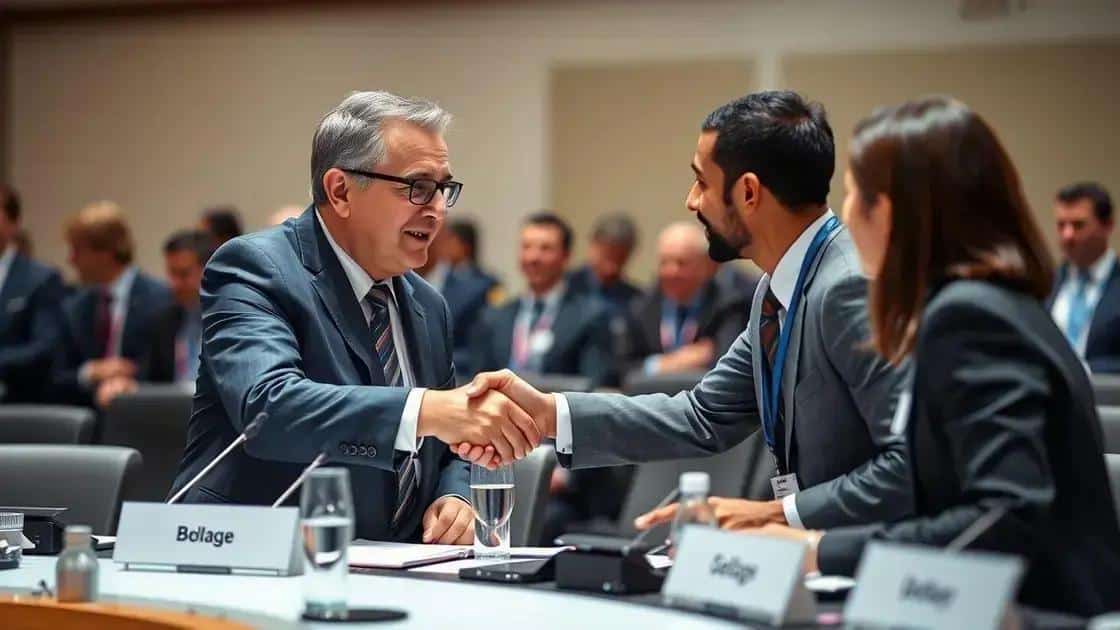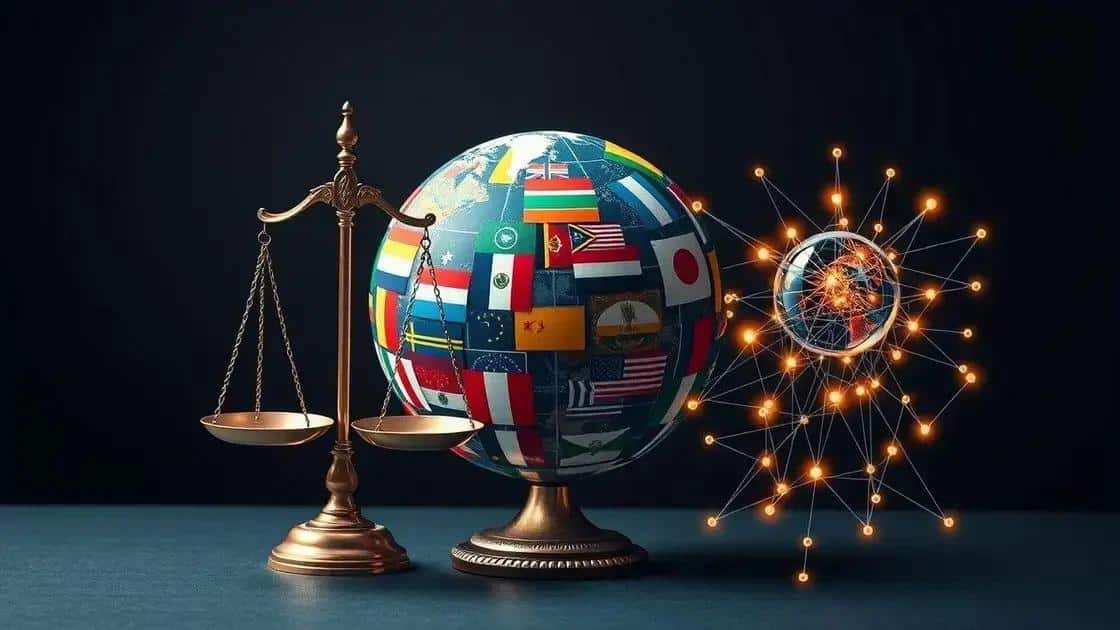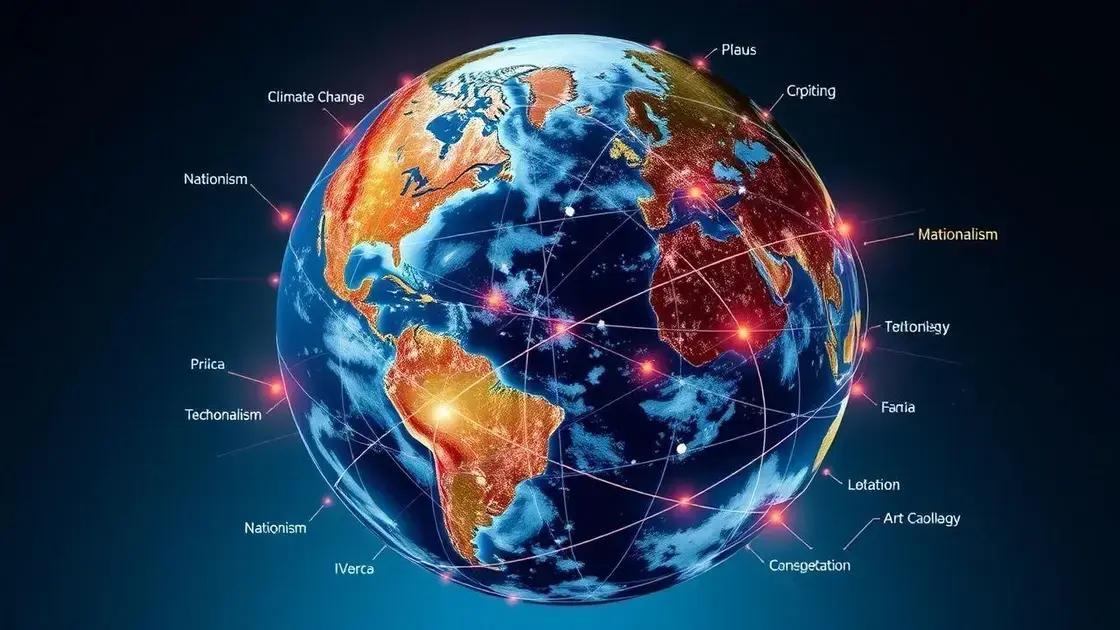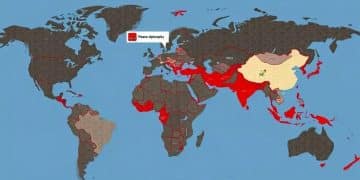International relations: shaping a collaborative future

Anúncios
International relations involves the interactions between countries, shaped by diplomacy, global challenges like nationalism and climate change, and trends toward multilateralism and technological cooperation for achieving peace and stability.
In today’s interconnected world, international relations play a crucial role in shaping our societies. Have you ever wondered how global decisions impact your life? From trade to security, this field affects us all.
Anúncios
Understanding the basics of international relations
Understanding international relations is key to grasping how countries interact with one another. At its core, this field examines the relationships between nations, focusing on how they communicate, cooperate, and sometimes conflict.
Various factors influence these interactions, including political systems, cultures, and economic interests. Each country has its own agenda and objectives, which can lead to both collaboration and competition. The study of international relations helps us make sense of global events, from trade negotiations to conflict resolutions.
Key Concepts in International Relations
There are several fundamental concepts that help frame our understanding of international relations. These concepts include:
Anúncios
- State Sovereignty: The principle that a state has authority over its territory and can govern itself without external interference.
- National Interest: The goals and objectives of a country, often centered around security, economic stability, and cultural preservation.
- Balance of Power: A situation in which nations have equal power, preventing any one nation from dominating others.
By understanding these concepts, we can better analyze international interactions. The role of international organizations, like the United Nations, also cannot be overlooked. These bodies foster dialogue and resolve disputes between nations, promoting peace and stability.
Impact of Globalization
Globalization has dramatically transformed international relations. The rapid exchange of information, goods, and ideas has made the world more interconnected. While this brings numerous benefits, it also creates complex challenges.
Countries are now interdependent, which can lead to both cooperation and tension. For example, economic crises in one nation can trigger repercussions around the world. Understanding how globalization affects international relations is essential for navigating today’s global landscape. As the world continues to evolve, so will the dynamics of international relations, highlighting the importance of staying informed and adaptable.
Key theories that define global interactions

Understanding the key theories of international relations is essential for analyzing global interactions. These theories provide frameworks that help scholars and policymakers predict how nations behave and interact within the international system.
One major theory is **Realism**. This perspective emphasizes the idea that nations are primarily motivated by their own interests, particularly security and power. Realists believe that conflict is inevitable due to the competitive nature of international politics.
Core Aspects of Realism
In Realism, several core aspects are considered:
- Power Struggle: States compete for power, often leading to conflicts and wars.
- Anarchy: The international system is anarchic, meaning there is no overarching authority.
- National Interest: Each state acts in accordance with its own national interests.
Another significant theory is **Liberalism**, which offers a more optimistic view of international relations. It suggests that cooperation and collaboration between nations are possible and beneficial. Liberals focus on the importance of international institutions and interdependence among states.
Foundations of Liberalism
Key foundations of Liberalism include:
- Global Trade: Economic ties can promote peace and stability.
- Human Rights: The protection of individual rights is essential for cooperation.
- International Organizations: Institutions like the United Nations facilitate dialogue and negotiation.
Theory of Constructivism is another important approach in international relations. It posits that the identities and interests of nations are socially constructed through communication and interaction. This perspective encourages us to look beyond material factors and consider the role of ideas and beliefs in shaping global actions.
By understanding these theories—Realism, Liberalism, and Constructivism—we can gain deeper insights into the complexities of international relations. They guide us in analyzing the motivations behind countries’ actions and the ongoing dynamics of global interactions.
The role of diplomacy in international relations
Diplomacy plays a critical role in shaping international relations. It involves negotiation and dialogue between countries to resolve conflicts and promote cooperation. Understanding how diplomacy works helps us appreciate its importance in maintaining global peace.
At its core, diplomacy is about building relationships. Countries use diplomats to represent their interests, discuss policies, and find common ground. Effective diplomacy can prevent misunderstandings that often lead to conflicts.
Types of Diplomacy
There are various types of diplomacy that nations employ:
- Bilateral Diplomacy: This involves direct negotiations between two countries, focusing on specific issues that affect their relationship.
- Multilateral Diplomacy: Involves multiple countries coming together to discuss global challenges, often through international organizations like the United Nations.
- Public Diplomacy: Aims to influence public opinion in other countries, using cultural exchanges and information sharing to foster goodwill.
In addition to these types, diplomacy is often essential during crises. When tensions rise, skilled diplomats work swiftly to diffuse situations and prevent escalation. They engage in negotiations, propose compromises, and communicate with stakeholders to achieve peaceful resolutions.
The Importance of Communication
Effective communication is a cornerstone of successful diplomacy. Diplomats must understand different cultures, languages, and perspectives. This understanding allows them to navigate complex international issues and build trust.
Moreover, diplomacy is not only about reaching agreements; it’s about maintaining those relationships over time. Continuous dialogue helps countries manage ongoing challenges and adapt to new situations. The role of diplomacy in international relations is thus not just to resolve conflicts but also to prevent them through proactive engagement.
Current challenges and future trends in international relations

The world of international relations faces several challenges, shaped by evolving global dynamics. Understanding these challenges is vital for anticipating future trends that could influence global stability.
One major challenge is the rise of nationalism. Countries are increasingly prioritizing their domestic interests over global cooperation. This shift can lead to tensions and conflicts between states. For instance, as nations adopt more self-centered policies, international agreements may falter.
Key Challenges in International Relations
Some of the pressing challenges include:
- Geopolitical Tensions: Power struggles between major nations can escalate, affecting global security.
- Climate Change: Environmental issues demand international cooperation; however, differing priorities can hinder progress.
- Technological Advancements: Cybersecurity threats and information warfare are new battlegrounds in international relations.
The future of international relations may also be shaped by emerging trends. Globalization continues to connect countries, creating interdependence. However, this connection can be a double-edged sword. While it fosters cooperation, it also exposes nations to external shocks.
Future Trends to Watch
Several trends are likely to define the landscape of global relations:
- Increased Multilateralism: Countries may rely more on international organizations to address complex challenges that require collective action.
- Focus on Human Rights: As awareness of global issues like inequality rises, nations will face pressure to prioritize human rights in their foreign policies.
- Technological Cooperation: Countries may begin to collaborate on technology sharing, aiming to tackle common issues such as cybersecurity.
The future presents both challenges and opportunities for international relations. By understanding current dynamics and potential trends, nations can better navigate the complex web of global interactions.
In conclusion, understanding international relations is vital in today’s interconnected world. The challenges nations face, such as rising nationalism, geopolitical tensions, and climate change, require collaborative solutions. As we look to the future, embracing multilateralism and technology cooperation can foster global peace and stability. By remaining informed about these dynamics, we can contribute to a more unified world.
FAQ – Frequently Asked Questions about International Relations
What is the main role of diplomacy in international relations?
Diplomacy is crucial as it helps resolve conflicts and enables countries to work together towards shared goals.
What are the current challenges facing international relations?
Key challenges include rising nationalism, geopolitical tensions, climate change, and cybersecurity threats.
How does globalization impact international relations?
Globalization fosters interdependence among nations, promoting cooperation, but also exposes them to various risks and challenges.
What trends are shaping the future of international relations?
Emerging trends include increased multilateralism, a focus on human rights, and technological cooperation among nations.






